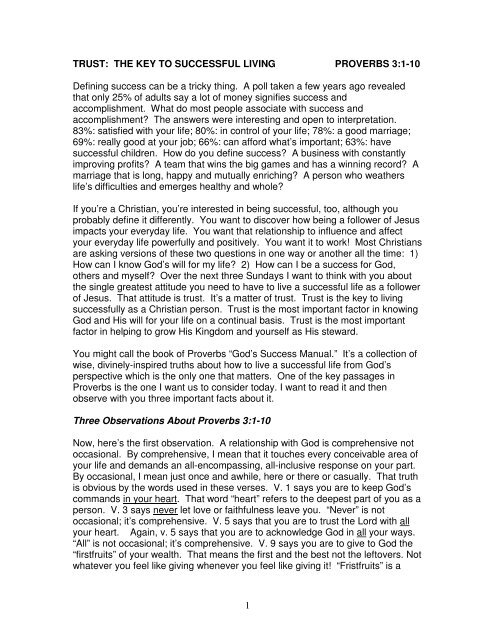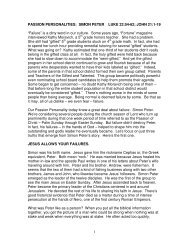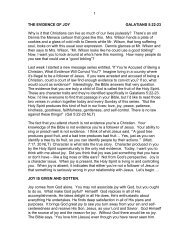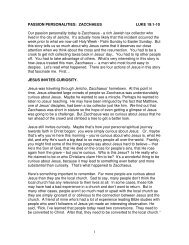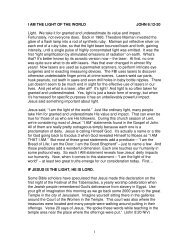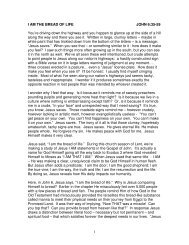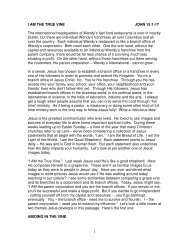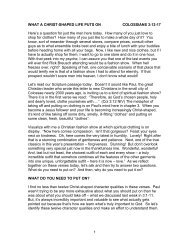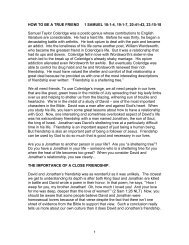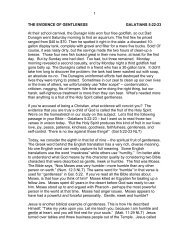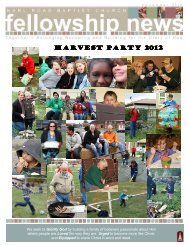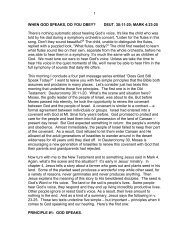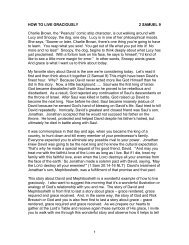1 TRUST: THE KEY TO SUCCESSFUL LIVING PROVERBS 3:1-10 ...
1 TRUST: THE KEY TO SUCCESSFUL LIVING PROVERBS 3:1-10 ...
1 TRUST: THE KEY TO SUCCESSFUL LIVING PROVERBS 3:1-10 ...
You also want an ePaper? Increase the reach of your titles
YUMPU automatically turns print PDFs into web optimized ePapers that Google loves.
<strong>TRUST</strong>: <strong>THE</strong> <strong>KEY</strong> <strong>TO</strong> <strong>SUCCESSFUL</strong> <strong>LIVING</strong> <strong>PROVERBS</strong> 3:1-<strong>10</strong>Defining success can be a tricky thing. A poll taken a few years ago revealedthat only 25% of adults say a lot of money signifies success andaccomplishment. What do most people associate with success andaccomplishment? The answers were interesting and open to interpretation.83%: satisfied with your life; 80%: in control of your life; 78%: a good marriage;69%: really good at your job; 66%: can afford what’s important; 63%: havesuccessful children. How do you define success? A business with constantlyimproving profits? A team that wins the big games and has a winning record? Amarriage that is long, happy and mutually enriching? A person who weatherslife’s difficulties and emerges healthy and whole?If you’re a Christian, you’re interested in being successful, too, although youprobably define it differently. You want to discover how being a follower of Jesusimpacts your everyday life. You want that relationship to influence and affectyour everyday life powerfully and positively. You want it to work! Most Christiansare asking versions of these two questions in one way or another all the time: 1)How can I know God’s will for my life? 2) How can I be a success for God,others and myself? Over the next three Sundays I want to think with you aboutthe single greatest attitude you need to have to live a successful life as a followerof Jesus. That attitude is trust. It’s a matter of trust. Trust is the key to livingsuccessfully as a Christian person. Trust is the most important factor in knowingGod and His will for your life on a continual basis. Trust is the most importantfactor in helping to grow His Kingdom and yourself as His steward.You might call the book of Proverbs “God’s Success Manual.” It’s a collection ofwise, divinely-inspired truths about how to live a successful life from God’sperspective which is the only one that matters. One of the key passages inProverbs is the one I want us to consider today. I want to read it and thenobserve with you three important facts about it.Three Observations About Proverbs 3:1-<strong>10</strong>Now, here’s the first observation. A relationship with God is comprehensive notoccasional. By comprehensive, I mean that it touches every conceivable area ofyour life and demands an all-encompassing, all-inclusive response on your part.By occasional, I mean just once and awhile, here or there or casually. That truthis obvious by the words used in these verses. V. 1 says you are to keep God’scommands in your heart. That word “heart” refers to the deepest part of you as aperson. V. 3 says never let love or faithfulness leave you. “Never” is notoccasional; it’s comprehensive. V. 5 says that you are to trust the Lord with allyour heart. Again, v. 5 says that you are to acknowledge God in all your ways.“All” is not occasional; it’s comprehensive. V. 9 says you are to give to God the“firstfruits” of your wealth. That means the first and the best not the leftovers. Notwhatever you feel like giving whenever you feel like giving it! “Fristfruits” is a1
comprehensive idea not an occasional one. A relationship with God iscomprehensive – all of you all of the time – not occasional – some of you someof the time.Here’s a second observation. God’s commands precede God’s promises. In v.1, God commands you not to forget His teaching and to keep all of Hiscommands. Then in v. 2 you find a promise – a long and prosperous life. In v. 3,God commands you to act in love and faithfulness always. Then in v. 4, you finda promise – a successful life in the eyes of God and others. In v. 5, Godcommands you to trust in Him rather than in yourself and to acknowledge Hisguidance in your life at all times. Here comes the promise in v. 6: God will thenmake straight the direction of your life. Once again in v. 7 you find a series ofcommands: don’t trust in your own wisdom, fear the Lord and stay away fromevil. It’s followed by a promise in v. 8: physical and emotional health. Finally, inv. 9 you find yet another command: honor the Lord with your wealth. And it’sfollowed by yet another promise in v. <strong>10</strong>: financial blessing.In every case, God’s commands precede God’s promises. If you said to God,“Lord, I want to live a long life,” God would respond, “First of all, obey Me with allyour heart.” If you said to God, “Lord, I want to have a successful life,” Godwould respond, “First of all, love Me and be faithful to Me.” If you said to God,“Lord, I want to have a clear sense of direction and purpose to my life,” Godwould respond, “First of all, trust Me with all of your heart, don’t trust in yourselfand acknowledge Me in everything.” If you said to God, “Lord, I need financialblessing in 20<strong>10</strong>,” God would respond, “First of all, honor Me with your money.”That’s leads to a third observation. In every case, God’s blessings are conditionalon your obedience. Nobody just gets long life. It’s the result of obeying Godfrom your heart. Nobody just gets a God-defined successful life. It’s the result ofpracticing love and faithfulness consistently. Nobody just gets God’s will for hisor her life clearly explained. It’s the result of trusting in the Lord with all of yourheart. And nobody just gets financial blessing. It’s the result of honoring theLord with your money. First, obedience; then, blessing. It’s true in every area ofyour life and mine. God’s blessings are conditional on your obedience. Withthose insights into this passage, let me ask you the first of two simple questions:QUESTION #1: DO I <strong>TRUST</strong> GOD?Think about that question before you answer. It’s easy to be flippant abouttrusting God. Do I really trust God for everything? Let’s remember that arelationship with God is comprehensive not occasional. Do I trust God for the“big things” (salvation, eternal life, forgiveness) but struggle to trust Him for the“little things” (my job, my relationships, my finances)? Do I trust God for majordecisions but not so much people issues? Do I trust God as long as I can get myown fingers into a situation and help Him out a little bit with the solution?2
What does it mean to trust God? It’s not just believing that there is a God. It’snot just having happy thoughts about God. Nor is it just running to God whenyou get into trouble and then ignoring Him after He’s rescued you. Trust is anattitude born of a relationship. You can never trust God until and unless youdevelop a personal relationship with Him. As you get to know a person, yourtrust in him or her is built up or torn down. God is a Person who can and wantsto be known; therefore, He can be trusted by those who make a consistent effortto get to know Him.Trust is dependency. So who do you depend upon? Your spouse, your parents,your adult children, your close friends, or maybe just yourself. Why? Becauseyour relationship with those people has given you sufficient knowledge that theycan be depended upon for certain things in life. That whole concept ofdependency is a little threatening to many of us. It can suggest inability orweakness on your part – not having your act together in some way. OurAmerican culture encourages us to admire independent people even though theyare often the unhappiest, least fulfilled and least successful people of all! Incontrast, Christians are people who are learning how to depend on God moreand more every day for – literally – everything.Trust is a process. It doesn’t happen all at once. It starts the moment you stoptrusting in yourself to somehow earn or merit eternal life and you transfer thattrust to Jesus who died on the cross and rose again to pay the penalty for yoursins. But then that trust continues to develop throughout your entire life as youlearn to trust God in new ways. Just when you think you’re trusting God as fullyas you possibly can, He will reveal areas of your life where you’re holding out onHim! It might be your marriage, your health, your career path, your job atpresent, your kids or your finances. All of a sudden, God will bring you to amoment of realization, “You mean, God, I have to trust You for this, too?”Trust is love. It’s impossible to love someone without trusting that person atsome level. By the same token, you can never fully trust someone withoutcoming to love that person at some level either. Trust and love just go hand inhand in any good relationship. You will only trust God to the extent that you loveHim. Then, as you grow in your love for God through all the experiences of lifeand living, you come to trust Him more comprehensively.Why is God worthy of your ultimate trust? Well, what does God’s Word sayabout God? God knows all things. You don’t know what’s going to happen toyou this afternoon! The Bible says, “Nothing in all creation is hidden from God.Everything is naked and exposed before his eyes, and he is the one to whom weare accountable.” (Hebrews 4:13 NLT) God never changes. People change.Circumstances change. You change. Earlier this month we looked at the Bibleverse, “Jesus Christ is the same yesterday and today and forever.” (Hebrews13:8 NIV) God never fails. The Bible says, “The faithful love of the LORD neverends! His mercies never cease. Great is his faithfulness; his mercies begin3
afresh each morning.” (Lamentations 3:22-23 NLT) In our home, I have aplague hanging that hung in my parents’ home that has a message that’s verydear to me. It simply says, “Jesus never fails.” God loves you and promisesnever to leave you. “‘The LORD himself goes before you and will be with you; hewill never leave you nor forsake you. Do not be afraid; do not be discouraged.’"(Deuteronomy 31:8 NIV)Do you remember a TV commercial that aired a few years ago? The commercialbegins with a little girl standing alone in a picturesque meadow. The camera thenpans to another part of the field where it shows a gigantic rhinoceros. This huge,dangerous animal begins a lethal charge towards the girl, whose serene andhappy face remains unmoved. As the rhinoceros gets closer, the words appearon the screen, "Trust is not being afraid." A split second before the rhino tramplesthe helpless child, it stops, and the girl, her smile never wavering, reaches upand pets the animal on its massive horn. The final words then appear, "evenwhen you are vulnerable." The commercial was designed to tout the abilities ofan insurance company to protect its clients from the uncertainties of life. Fatchance! How much more should it describe you and me who, has followers ofJesus, can confidently say with the psalmist, "This I declare about the LORD: Healone is my refuge, my place of safety; he is my God, and I trust him.” (Psalm91:2 NLT) Now, here’s a second question I want to ask you.QUESTION #2: CAN GOD <strong>TRUST</strong> YOU?In other words, have you proven to be trustworthy in your relationship with God?Let’s reflect on that question by asking it in three different ways. Here’s the firstone: am I trustworthy in adversity? All too often that’s where many people giveup on God. Frankly, it’s easy to trust the Lord when everything is going well, butlet some adversity enter your life – some disappointment, some setback, someheartache, some financial problem – what’s your attitude then? All too often ourattitude can become, “Well, God, now what’s the deal here? I thought I wassupposed to just trust in You and then You’re supposed to make the road of lifepleasant for me!” You can’t have a relationship with God for very long withoutdiscovering that He allows adversity to enter your life and, in fact, uses it as aprimary way to get you to grow up spiritually. Are you trustworthy in adversity?Can God trust you? Here’s a second way to ask that question: am I trustworthyin blessing? Have you observed the fact that too much success can ruin aperson about as quickly as too much failure? There is an all too human tendencyto sort of put God on the shelf, so to speak, when things are going well in ourlives. “Hey, the job’s great, the marriage is good, the kids are doing well,finances are OK, my health is super!” The temptation is to begin to coastspiritually and take your relationship with God for granted. You can forgetsomething very important when life is going well. What’s that? God is theultimate source of every blessing in your life. The extent to which you genuinelythank God for all the blessings He provides – and that thankfulness gets reflected4
est in your daily behavior and attitudes – is an indicator of your trust in Him.The temptation you so often face is putting your trust in the blessing Godprovides rather than in the God who provides it! So people put their trust in theirjob, their relationships, their investments, their own intelligence, their own workethic rather than in the One who makes all those possible.Can God trust you? Here’s a third way to ask that question: am I trustworthywith money? I raise that issue for two reasons. First, I’m addressing the issue offinancial stewardship in this series of three messages. Second, it’s a part of ourtext today. “Honor the LORD with your wealth, with the firstfruits of all yourcrops; then your barns will be filled to overflowing, and your vats will brim overwith new wine.” (Proverbs 3:9-<strong>10</strong> NIV) So, what does it mean to “honor the Lordwith your wealth”? When you search out the biblical answer you discover that tohonor the Lord with your wealth necessitates giving at least the tithe – <strong>10</strong>% ofyour income – to the Lord. And that’s not where you end; that’s where you start.I can only come to one conclusion. When I give less than <strong>10</strong>% - 3%... 6%... 9 and1/2% - I am not honoring the Lord. I can rationalize and give less, I can makeexcuses and give less, but the fact is that I dishonor God when I give less.At the time Proverbs was written, Israel was an agricultural society. Wealth wasdetermined by land and crops not bank accounts and investment portfolios. Youhonored God by bringing Him the first and the best that your land produced, notthe leftovers or what was second-rate in quality. You brought Him the bestsheep, the best ox, the best wheat, the best barley – not the sick sheep, not thedead ox, not the littlest stalks of grain. The first and the best. So what’s theprinciple here that we can transfer to our day and time? You don’t give Godwhat’s leftover in your checkbook at the end of the month and assume thathonors God. If your checkbook is like mine, there’s not usually a whole lot leftover! No, that kind of giving doesn’t honor the Lord. In fact, that reveals a lack ofrespect for God and a lack of gratitude for what He’s allowed you to have interms of material wealth.What does honoring the Lord with your wealth look like? You refuse to just giveHim what’s left over. Instead, you figure out what is a tithe of your income andyou put it into your monthly budget. Make it the first check you write every timeyou get paid. “The first and the best.” Give it whether you come to church or not.It’s amazing how many Christians forget to tithe if they miss a Sunday or two dueto illness, vacation or whatever. Do you forget to pay your mortgage when yougo on vacation? Do you just send in a portion of your electric bill payment ifyou’re away for a portion of the month? “The first and the best.” Here’s thepoint: what you give and how you give it is an indication of whether you trulytrust God and whether He can trust you. Am I trustworthy with money? The firstand best answer to that question is whether I tithe faithfully.Is God desperate for your money? Not at all! He doesn’t need your paltry littletithe or mine. He owns everything! But the fact is that He does want to bless you.5
But, blessing comes to you and me as the result of obedience. Remember thesecond and third observations from our text? God’s commands always precedeGod’s promises. Yes, God does promise financial blessing in v. <strong>10</strong>. But thatpromise is preceded by a command: “Honor the Lord with your wealth.” Then,again, God’s blessings are conditional on your obedience. Yes, God wants tobless you, but He withholds blessing until you obey. That principle is true inevery area of life including your finances. If you’re tithing, you can ask God forfinancial blessing. You’re on solid ground. Why? Because you’re obeying Himfinancially. You’re walking along Obedience Road now, so to speak, and beforelong Blessing is going to run into you! But, if you’re not tithing, why bother to askGod to bless your finances? You’re not obeying Him. It’s a little like an 8 yearold kid asking his parents to raise his allowance while he’s stealing money out oftheir wallets!Dear friends, whether its money matters, success in life, relationships withothers, guidance in major life decisions – the principles are the same. Arelationship with God is comprehensive not occasional. God’s commandsprecede God’s promises. God’s blessings are contingent on your obedience. It’sall a matter of trust. And trust is the key to successful living as God definessuccess. Can God trust you? Do you trust God? As I close today, I want to shiftgears for a few minutes. I believe one reason we find it hard to really trust God isthe fact that we buy into all of these small, limited and little ideas about God.What we really need is a revelation or a reminder of the incomparable bigness ofour God! Do you know Him? Do you trust Him? Can He trust you? Trust is thekey to successful living as a follower of the Lord Jesus Christ.6


